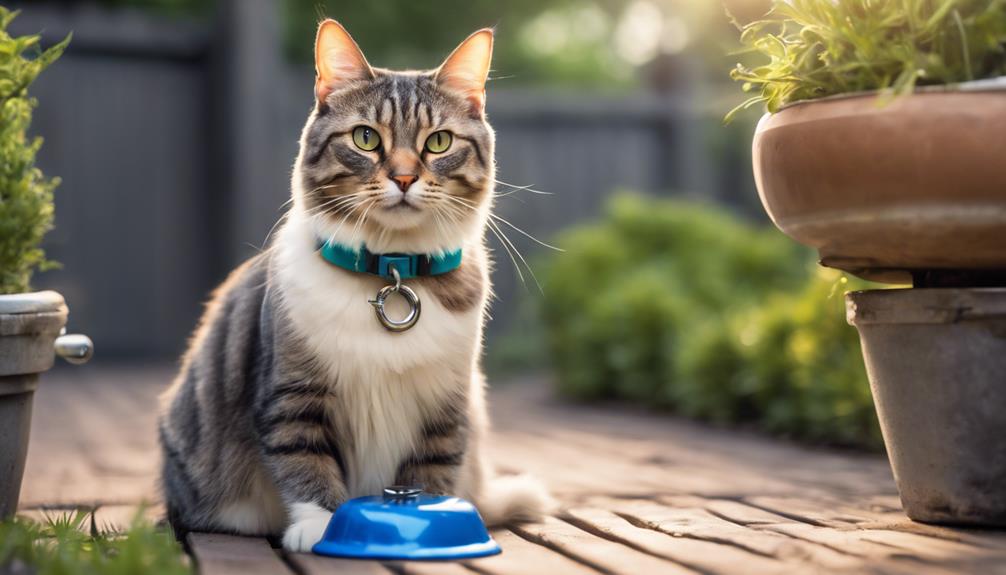Impacts of Outdoor Living on Cats' Health
When your feline companions venture outdoors, they encounter a variety of enriching experiences. But have you considered the potential impacts on their well-being?
From the benefits of exploring nature to the risks of exposure, outdoor living for cats is a complex issue that requires careful consideration.
Stay tuned to uncover the essential aspects that can influence your cat's health and happiness in the great outdoors.
Health Benefits of Outdoor Exploration
Exploring the outdoors can significantly improve your cat's physical and mental well-being. When your feline companion is allowed to roam outside, it experiences behavioral enrichment that's hard to replicate indoors. The sights, sounds, and smells of nature provide a stimulating environment that can prevent boredom and alleviate stress. This enrichment can lead to a happier and more content cat overall.
In addition to the mental benefits, outdoor exploration also offers important physical activity for your cat. Cats are natural hunters and explorers, and being outside allows them to exhibit these behaviors to their fullest. Hunting insects, climbing trees, or simply running around all contribute to your cat getting the exercise it needs to stay healthy. Regular physical activity can help prevent obesity, improve muscle tone, and enhance overall cardiovascular health in your furry friend.
Risks of Outdoor Exposure for Cats
Outdoor exposure can pose various risks to your cat's health and safety. When your cat roams outdoors, they're exposed to predatory dangers such as other animals like dogs, coyotes, or even larger wildlife that may cause harm. This exposure can lead to injuries, infections, or even fatalities. Additionally, outdoor exploration can trigger behavioral changes in your cat. They may become more aggressive or fearful due to encounters with other animals or territorial disputes.
Moreover, weather impact is a significant risk for outdoor cats. Extreme temperatures, storms, or natural disasters can endanger your cat's well-being. They may suffer from heatstroke in hot weather or hypothermia in cold conditions. Ensuring your cat has adequate shelter and access to fresh water is crucial to mitigating these risks.
Territorial behavior is another factor to consider. Outdoor cats may engage in fights with other felines over territory, leading to injuries and the spread of diseases. This behavior can also increase the chances of your cat getting lost or becoming disoriented in unfamiliar surroundings.
Exercise and Mental Stimulation Outdoors
Engaging in outdoor activities can provide cats with essential exercise and mental stimulation to support their overall well-being. Outdoor exploration allows cats to engage in natural behaviors like climbing, running, and hunting, which are crucial for their physical and mental enrichment. The stimulation they receive from interacting with the environment can help prevent boredom and reduce stress, leading to a happier and healthier feline companion.
Physical activity outdoors is vital for maintaining a healthy weight and promoting cardiovascular health in cats. Running, jumping, and exploring the outdoor environment can help prevent obesity and its associated health problems. Additionally, the exposure to sunlight during outdoor playtime allows cats to naturally synthesize vitamin D, which is essential for bone health and overall immunity.
Mental stimulation outdoors is equally important for cats. The sights, sounds, and smells of the outdoors provide sensory enrichment that can keep your cat's mind sharp and engaged. Hunting for prey, even if just for play, stimulates their natural instincts and provides a sense of fulfillment. This mental exercise is vital for preventing cognitive decline as your cat ages.
Increased Risk of Infections Outside
When allowing your cat outside, be mindful of the increased risk of infections they may encounter. Outdoor environments expose your feline friend to various potential pathogens that can compromise their health. Here are some key points to consider for risk management and supporting your cat's immune system:
- Exposure to Wildlife: Cats exploring outdoors may come into contact with wildlife carrying diseases such as rabies, feline leukemia virus (FeLV), or feline immunodeficiency virus (FIV). These infections can be transmitted through scratches, bites, or even mutual grooming.
- Parasites: Outdoor cats are more prone to parasites like fleas, ticks, and intestinal worms. These parasites not only affect your cat's health but can also be transmitted to humans in the household.
- Contaminated Environment: Outdoor areas can harbor bacteria, viruses, and fungi that can cause respiratory, gastrointestinal, or skin infections in cats. Keeping your cat away from stagnant water sources and areas with high rodent activity can reduce the risk of exposure.
- Vaccinations and Regular Check-ups: To help bolster your cat's immune system against potential outdoor threats, ensure they're up to date on vaccinations and schedule regular veterinary visits for preventive care and early detection of any health issues.
Natural Diet Vs. Hunting Instincts
Considering the impact of outdoor living on your cat's health, exploring their natural diet versus hunting instincts is crucial for understanding their dietary needs and behaviors. Cats are natural hunters with strong instincts to seek out prey. This instinct is deeply ingrained in them, leading to a preference for fresh meat over processed foods. When given the choice between a natural diet and processed cat food, many outdoor cats will lean towards their hunting instincts and opt for natural prey if available.
In the wild, cats are skilled hunters, relying on their agility and sharp senses to catch small animals. This hunting behavior not only satisfies their natural instincts but also provides them with a diet rich in protein and essential nutrients. When outdoor cats exhibit begging behavior at home, it may be a manifestation of their hunting instincts, as they're wired to seek out food actively.
The contrast between a natural diet and processed cat food highlights the importance of understanding your cat's biological needs. While processed cat food can provide convenience and balanced nutrition, incorporating elements of a natural diet can cater to their hunting instincts and overall well-being. By recognizing and accommodating your cat's natural instincts, you can promote a healthier lifestyle that aligns with their evolutionary needs.
Sunlight and Vitamin D for Cats
Exploring the benefits of sunlight exposure for cats can shed light on the importance of Vitamin D in their overall health. When your feline friend basks in the sun, their body naturally synthesizes Vitamin D, essential for calcium absorption and bone health. Here's how sunlight and Vitamin D play a crucial role in keeping your cat healthy:
- Indoor alternatives and supplements: If your cat is primarily indoors, consider providing access to sunny spots near windows or using special UV lamps designed for pets to ensure they get sufficient Vitamin D.
- Shade for heatstroke prevention: While sunlight is beneficial, ensure your outdoor cat has access to shaded areas to prevent overheating and potential heatstroke during hot days.
- Supplemental Vitamin D: If your cat has limited sun exposure or specific health conditions, consult your veterinarian about Vitamin D supplements to maintain optimal levels for their well-being.
- Balancing exposure: It's essential to strike a balance between allowing your cat to enjoy sunlight for Vitamin D synthesis and ensuring they've shaded areas to rest and cool down, especially during peak sun hours.
Safety Measures for Outdoor Cats

To ensure the well-being of your outdoor cat, implementing safety measures is crucial. Escape prevention is essential for outdoor cats to avoid potential dangers such as traffic accidents or getting lost. Make sure your outdoor feline has proper identification, whether through a collar with tags or a microchip. Additionally, consider creating a secure outdoor enclosure or catio to provide a safe space for your cat to enjoy the outdoors without being exposed to risks.
Boundary training is another important aspect of keeping your outdoor feline safe. Teach your cat the boundaries of your property to prevent them from wandering into neighboring yards where they could encounter aggressive animals or ingest toxic plants. You can use positive reinforcement techniques such as treats or toys to reinforce these boundaries effectively.
Regularly inspect the outdoor environment for any potential hazards like sharp objects, chemicals, or small openings where your cat could get stuck. By being proactive and removing these risks, you can significantly reduce the chances of accidents or injuries to your outdoor cat. Remember, the safety and well-being of your outdoor feline companion are in your hands, so take the necessary precautions to keep them safe and healthy.
Monitoring Health for Outdoor Felines
Regularly monitor your outdoor cat's health by observing their behavior and physical condition for any signs of illness or injury. Outdoor felines have a higher likelihood of encountering health issues due to their exposure to various elements and potential risks while enjoying their outdoor playtime. By keeping a close eye on your cat's well-being, you can promptly address any concerns that may arise.
Here are some essential habits to help you effectively monitor your outdoor cat's health:
- Regular Vet Check-ups: Schedule routine check-ups with your veterinarian to ensure your cat is healthy and up to date on vaccinations.
- Observing Eating and Drinking Habits: Monitor your cat's appetite and water intake, as changes can indicate underlying health issues.
- Checking for Injuries: Inspect your cat regularly for any wounds, scratches, or signs of limping that may require medical attention.
- Monitoring Behavioral Changes: Pay attention to any shifts in your cat's behavior, such as lethargy, aggression, or excessive grooming, which may indicate sickness or distress.
Frequently Asked Questions
How Can I Train My Indoor Cat to Safely Transition to an Outdoor Lifestyle?
To safely transition your indoor cat to an outdoor lifestyle, start with outdoor training. Gradually introduce them to the outdoors, supervising their first few ventures. Monitor their behavior adjustment and provide guidance as needed.
Create a safe outdoor space with appropriate shelter and access to food and water. Slowly increase their outdoor time to help them acclimate. Remember, patience and consistency are key in this process.
Are There Specific Plants or Flowers in My Garden That Could Be Harmful to My Outdoor Cat?
When checking your garden for potentially harmful plants, keep an eye out for any toxic plants that could pose a danger to your outdoor cat. Take precautions to remove or restrict access to these plants.
Prioritize garden safety by ensuring that your outdoor space is free of any hazards that could harm your feline friend. Stay vigilant and implement necessary precautions to create a safe outdoor environment for your cat to enjoy.
What Are Some Signs That My Outdoor Cat May Be Experiencing Stress or Anxiety?
If your outdoor cat is experiencing stress or anxiety, watch out for signs like sudden behavioral changes. These can indicate that your furry friend might be feeling overwhelmed.
To help manage anxiety, create a safe and secure environment for your cat outdoors.
Prioritizing your feline's well-being is crucial, so be attentive to stress indicators and address any issues promptly for a happier and healthier outdoor cat.
How Can I Protect My Outdoor Cat From Encountering Other Animals or Potential Predators?
To protect your outdoor cat from other animals or predators, consider using outdoor supervision and invisible fencing.
Cat collars with identification tags are also essential.
Creating safe shelters where your cat can retreat if needed is crucial.
Is It Safe for My Outdoor Cat to Interact With Other Neighborhood Cats?
When introducing a new cat to your outdoor cat, consider their personalities and supervise their interactions. Allow gradual socialization opportunities to help them get to know each other.
Monitoring their behavior can prevent potential conflicts and ensure a safe and positive experience. Outdoor cat socialization opportunities can lead to new friendships and enrich your cat's social life.
Conclusion
Overall, outdoor living can have both positive and negative impacts on a cat's health.
While it provides exercise, mental stimulation, and access to a natural diet, there are risks of infections and safety concerns.
It's important to carefully monitor your outdoor cat's health and provide necessary safety measures to ensure their well-being.
By balancing the benefits and risks, you can help your feline companion enjoy a healthy and fulfilling outdoor lifestyle.
